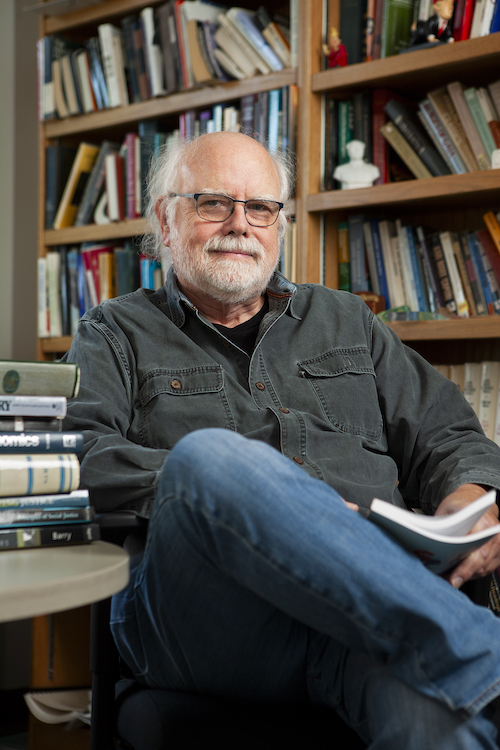
Question Marked

Professor John Watkins encourages critical examination of different perspectives
by Autumn Thatcher (MSC '15)
High in the Uintah Mountains is Little Brush Creek Cave. At 5.93 miles long and 658 miles deep, it is the longest cave in Utah—the 37th deepest in the United States. When the snow begins to melt in spring, thousands of acres of snowmelt run into Little Brush Creek and flow into the cave. It sees over 250 visitors per year—offering many the opportunity to gain new perspective.
“Have you ever heard of spelunking?” John Watkins, professor of economics asks.
It’s a question that comes out of left field as John is describing the process of writing his recently published book: The Origins and Evolution of Consumer Capitalism: A Veblenian-Keynesian Perspective.
Spelunking, the hobby of exploring caves, isn’t necessarily related to the book, but it is, John says, a way to describe the study of economics.
“Economics is an extraordinarily rich field, and there’s a great deal of controversy. And partly, the reason for the controversy is the different interpretations,” John says. “It gives rise to different points of view. When I teach, I argue that studying economics is much like spelunking.”
When he was in his early 20s, John and some friends went spelunking in Little Brush Creek cave. He recounts over eight hours of feeling their way through the dark, relying on flashlights and intuition to make it safely out into the light of day.
“Caves, they’re not like mines. They’re not particularly dangerous. You’re not going to have things collapse on you, but if you lose your light, there’s no way you would find your way out,” John says. “What is disconcerting is you’re coming out of the cave, and your light is hitting, hopefully, the same structures, but it’s hitting them from a different point of view. It gives the appearance that you’re going the wrong way. Economics is much like that. What you see depends on your point of view, and your point of view is dependent on your values and experiences.”
John has spent over 40 years encouraging Westminster students to look at things from as many different perspectives as possible—and make their minds up from there. It’s an approach that encourages both introspection and extrospection. It challenges the status quo—and in the process it empowers individuals to reach resolutions for themselves. It’s a core component to John’s drive to set his students up for success.
John began his long career at Westminster in 1981 as an adjunct faculty member while earning his graduate degree. Teaching while a student himself was a learning experience that John deeply valued.
“In those days, they didn’t teach graduate students how to teach. You had to learn by doing,” he says. “It’s best to be kind to students and set them up to succeed as best you can.”
Preparing his students to succeed both in the classroom and later in their careers has become a source of pride for John. When he was serving as director of economics, he learned that Westminster’s economics program had been ranked 17th in the country for the percentage of students who went on to graduate or law school.
“One of my objectives, in terms of teaching, is to raise students’ level of confusion—and I say that tongue in cheek,” John says. “I have a point of view—everybody does if they’re thinking about social, political, and economic issues—but I always thought it important to introduce students to a wide variety of points of view. And I felt, at least for the intellectually curious students, if they’re faced with paradox or contradiction or opposing points of view, they tend to learn better than if they’re simply learning one particular perspective. Some of my most enjoyable students were the people who would engage, always with a degree of civility, in questioning and arguing.”
In another vein, John describes economics as much like kindergarten. “We connect dots, draw pictures, and tell stories. Most important are the stories: mappings between the models and the world we are trying to understand.”
As John thinks about what’s next (he’s currently semi-retired, teaching classes every other semester), he envisions time spent in his 1989 Westfalia camper van with his fellow searcher, Sandra, traveling Utah and beyond. Perhaps he will explore more caves, but he will always be finding ways to offer new perspectives. Whether through an op-ed he writes for The Salt Lake Tribune or casual conversation, John is a philosophical force, ever ready to challenge conventional thought. Until he retires from Westminster, he will continue to set his students up for success—one debate at a time.
“I have loved teaching at Westminster. I love economics and the breadth and diversity of views that it offers. I love explaining an idea to students to see their faces light up,” John says. “I’ve been really quite pleased and happy with how our economics students have gone on with the ability to think critically, to resort to the facts as best they can, and to question their own assumptions.”
About the Westminster Review
The Westminster Review is Westminster University’s bi-annual alumni magazine that is distributed to alumni and community members. Each issue aims to keep alumni updated on campus current events and highlights the accomplishments of current students, professors, and Westminster alum.
GET THE REVIEW IN PRINT Share Your Story Idea READ MORE WESTMINSTER STORIES